课程教学大纲
教学大纲和课程大纲

教学大纲和课程大纲教学大纲和课程大纲:为学习指明方向教学大纲和课程大纲是教育领域中常见的两个概念,它们在学习过程中起到了不可或缺的作用。
教学大纲是指教学活动的总体规划,而课程大纲则是具体课程的安排和内容要求。
本文将从教学大纲和课程大纲的定义、作用以及设计原则等方面进行探讨。
一、教学大纲和课程大纲的定义教学大纲是教学活动的总体规划,它涵盖了学习目标、教学内容、教学方法、评价方式等方面。
教学大纲的设计需要充分考虑学生的需求和能力水平,以及教学资源的利用情况,为教学活动提供明确的指导。
课程大纲是具体课程的安排和内容要求,它是教学大纲的具体体现。
课程大纲一般包括课程的名称、学时、学分、教学内容、教学方法、考核方式等信息,为学生提供了学习的框架和纲要。
二、教学大纲和课程大纲的作用教学大纲和课程大纲在学习过程中起到了重要的作用。
首先,它们为学习提供了明确的方向和目标。
通过教学大纲和课程大纲,学生可以清楚地了解到学习的内容和要求,有助于他们合理安排学习时间和精力。
其次,教学大纲和课程大纲有助于提高教学效果。
教学大纲可以帮助教师合理组织教学内容和教学方法,使教学过程更加系统和有序。
而课程大纲则可以帮助教师选择适当的教材和教学资源,提高教学质量。
此外,教学大纲和课程大纲还可以为学生提供学习的参考和依据。
学生可以通过教学大纲和课程大纲了解到学习的要求和标准,有助于他们进行自我评估和提高。
三、教学大纲和课程大纲的设计原则教学大纲和课程大纲的设计需要遵循一定的原则,以保证其有效性和实用性。
首先,教学大纲和课程大纲的设计应该符合学科的特点和学生的需求。
不同学科和不同年级的学生有不同的学习需求,教学大纲和课程大纲需要根据实际情况进行调整和优化。
其次,教学大纲和课程大纲的设计应该具有可操作性和可评估性。
教学大纲和课程大纲需要明确学习目标和评价方式,以便教师和学生进行教学和学习的有效管理和评估。
最后,教学大纲和课程大纲的设计应该具有灵活性和可持续性。
课程教学大纲
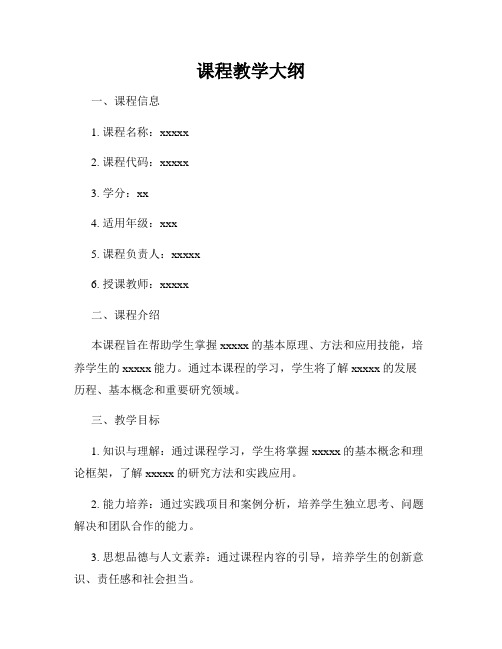
课程教学大纲一、课程信息1. 课程名称:xxxxx2. 课程代码:xxxxx3. 学分:xx4. 适用年级:xxx5. 课程负责人:xxxxx6. 授课教师:xxxxx二、课程介绍本课程旨在帮助学生掌握xxxxx的基本原理、方法和应用技能,培养学生的xxxxx能力。
通过本课程的学习,学生将了解xxxxx的发展历程、基本概念和重要研究领域。
三、教学目标1. 知识与理解:通过课程学习,学生将掌握xxxxx的基本概念和理论框架,了解xxxxx的研究方法和实践应用。
2. 能力培养:通过实践项目和案例分析,培养学生独立思考、问题解决和团队合作的能力。
3. 思想品德与人文素养:通过课程内容的引导,培养学生的创新意识、责任感和社会担当。
四、课程内容与安排本课程将分为以下模块进行教学:1. 模块一:xxxxx的概念和基本原理- 学习内容:xxxxx的定义、xxxxx的基本原理、xxxxx的相关理论- 教学方式:讲授、案例分析- 授课时数:x学时2. 模块二:xxxxx的应用领域- 学习内容:xxxxx在xxxxx领域的应用案例、xxxxx在xxxxx领域的发展趋势- 教学方式:讲授、案例分析、小组讨论- 授课时数:x学时3. 模块三:xxxxx实践项目- 学习内容:学生分组进行xxxxx实践项目,包括xxxxx的设计、xxxxx的实施和xxxxx的评估- 教学方式:实践项目指导、实地考察- 授课时数:x学时五、教学评估与考核1. 平时成绩占比:30%- 包括课堂表现、小组讨论、作业完成情况等方面的评估。
2. 期中考试占比:30%3. 期末考试占比:40%- 期末考试内容包括对xxxxx的理论知识和应用能力的综合考核。
六、参考教材1. 主教材:xxxxx2. 辅助教材:xxxxx七、其他要求1. 学生必须按时上交作业和实践项目报告,并参与课堂讨论和小组合作。
2. 课程评估结果将作为学生成绩的一部分,对学生的毕业要求和学位授予有重要影响。
课程教学大纲
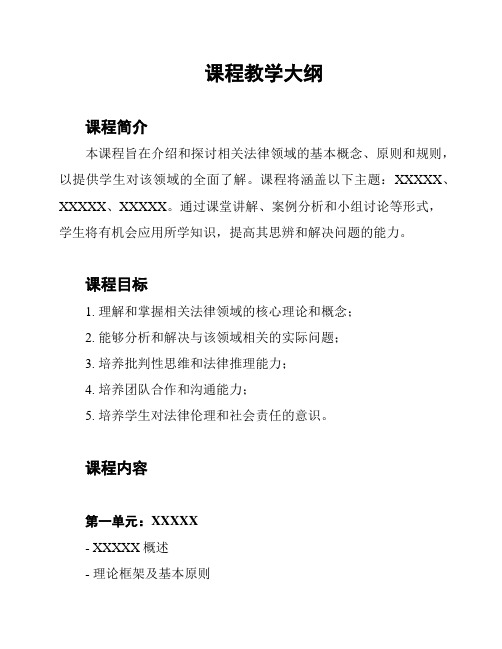
课程教学大纲课程简介本课程旨在介绍和探讨相关法律领域的基本概念、原则和规则,以提供学生对该领域的全面了解。
课程将涵盖以下主题:XXXXX、XXXXX、XXXXX。
通过课堂讲解、案例分析和小组讨论等形式,学生将有机会应用所学知识,提高其思辨和解决问题的能力。
课程目标1. 理解和掌握相关法律领域的核心理论和概念;2. 能够分析和解决与该领域相关的实际问题;3. 培养批判性思维和法律推理能力;4. 培养团队合作和沟通能力;5. 培养学生对法律伦理和社会责任的意识。
课程内容第一单元:XXXXX- XXXXX概述- 理论框架及基本原则- 关键案例分析第二单元:XXXXX- XXXXX概述- 理论框架及基本原则- 关键案例分析第三单元:XXXXX- XXXXX概述- 理论框架及基本原则- 关键案例分析教学方法- 课堂讲解:通过讲解相关理论和案例,引导学生对法律专业知识的深入理解。
- 小组讨论:组织学生进行小组讨论和案例分析,培养学生的团队合作和问题解决能力。
- 案例分析:通过分析真实案例,帮助学生将理论知识应用到实际情境中,提高实践能力。
评估方式- 课堂表现:考察学生对课程内容的理解和思考能力。
- 小组项目:学生需以小组形式完成相关项目,评估其团队合作与解决问题的能力。
- 个人论文:要求学生撰写一篇与课程相关的研究论文,评估其学术研究和写作能力。
参考资料- XXXXX- XXXXX- XXXXX以上是本课程的教学大纲,可能会根据实际教学需要进行适当调整。
欢迎大家参与课堂讨论和积极互动,提高自己的学术水平和专业能力。
祝大家学习愉快!。
课程教学大纲怎么写

课程教学大纲怎么写课程教学大纲是教学工作中的重要指导文件,它具有指导性、计划性和审查性的作用。
一个好的教学大纲能够明确课程设置、教学目标、教学内容、教学方法、教学评价等方面的要求,有利于教师有序地开展教学工作,提高教学效果。
下面将从以下几个方面介绍如何写好课程教学大纲。
一、明确课程设置在编写教学大纲时,首先要明确课程设置。
课程设置是教学活动的基础,它包括课程名称、学时、学分、课程性质等方面的内容。
在确定课程名称时,要简洁明了,能够准确反映课程内容和特点。
学时和学分是评价课程难度和深度的重要指标,要根据学生的学习进度和教学资源合理确定。
此外,课程性质也是教学大纲中需要注意的一点,不同性质的课程有不同的教学要求,要根据实际情况进行设置。
二、确定教学目标教学目标是教学大纲的核心内容,它直接关系到教学质量和效果。
在确定教学目标时,要考虑到学生的需求和实际情况,明确教学的总体目标和具体目标,确保目标明确、具体,并能够达到预期效果。
教学目标还包括知识目标、能力目标和素质目标等方面,要全面考虑,确保学生能够全面发展。
三、规划教学内容教学内容是教学大纲中的重要组成部分,它包括教学范围、教学重点和难点、教学要求等内容。
在规划教学内容时,要根据教学大纲的总体目标和教学任务,合理安排教学内容的顺序和深度,确保学生能够掌握基本知识和技能,提高综合素质。
教学内容要与实际教学任务相适应,具有科学性和系统性,能够引导学生主动学习。
四、选择教学方法教学方法是实现教学目标的重要手段,它直接关系到教学效果和学生的学习兴趣。
在选择教学方法时,要根据教学内容和学生的实际情况,合理选择教学手段和教学形式,采用多种教学方法相结合,注重启发式教学和互动式教学,提高学生的学习积极性和主动性,促进学生全面发展。
五、制定教学评价教学评价是教学大纲中必不可少的一部分,它是对教学目标的实现情况进行客观评价的过程。
在制定教学评价时,要考虑到评价的目的和内容,采用多种评价方法,如考试、作业、实验、讨论、课堂表现等,全面评价学生的学习情况和综合素质,促进学生的自主学习和批判性思维能力的培养。
课程 教学大纲
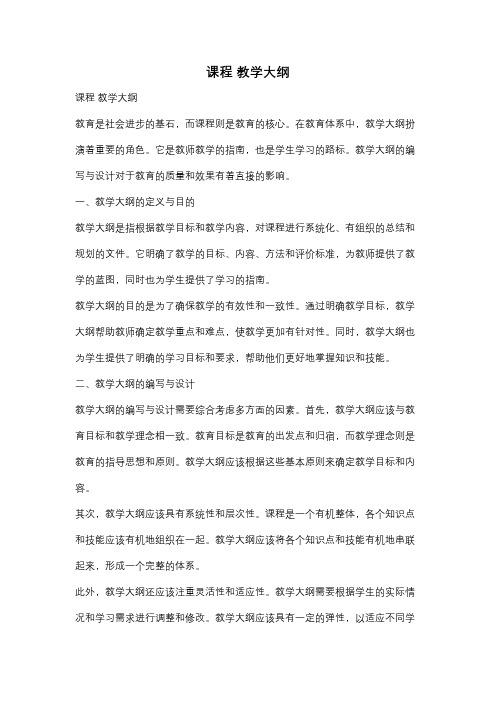
课程教学大纲课程教学大纲教育是社会进步的基石,而课程则是教育的核心。
在教育体系中,教学大纲扮演着重要的角色。
它是教师教学的指南,也是学生学习的路标。
教学大纲的编写与设计对于教育的质量和效果有着直接的影响。
一、教学大纲的定义与目的教学大纲是指根据教学目标和教学内容,对课程进行系统化、有组织的总结和规划的文件。
它明确了教学的目标、内容、方法和评价标准,为教师提供了教学的蓝图,同时也为学生提供了学习的指南。
教学大纲的目的是为了确保教学的有效性和一致性。
通过明确教学目标,教学大纲帮助教师确定教学重点和难点,使教学更加有针对性。
同时,教学大纲也为学生提供了明确的学习目标和要求,帮助他们更好地掌握知识和技能。
二、教学大纲的编写与设计教学大纲的编写与设计需要综合考虑多方面的因素。
首先,教学大纲应该与教育目标和教学理念相一致。
教育目标是教育的出发点和归宿,而教学理念则是教育的指导思想和原则。
教学大纲应该根据这些基本原则来确定教学目标和内容。
其次,教学大纲应该具有系统性和层次性。
课程是一个有机整体,各个知识点和技能应该有机地组织在一起。
教学大纲应该将各个知识点和技能有机地串联起来,形成一个完整的体系。
此外,教学大纲还应该注重灵活性和适应性。
教学大纲需要根据学生的实际情况和学习需求进行调整和修改。
教学大纲应该具有一定的弹性,以适应不同学生的学习进度和能力水平。
三、教学大纲的作用与意义教学大纲对于教学的质量和效果有着重要的影响。
首先,教学大纲明确了教学目标和内容,帮助教师确定教学重点和难点。
教师可以根据教学大纲来制定教学计划和教学方法,使教学更加有针对性和有效性。
其次,教学大纲为学生提供了明确的学习目标和要求。
学生可以根据教学大纲来制定学习计划和学习方法,使学习更加有条理和高效。
此外,教学大纲还可以作为教学评价的依据。
教学大纲中明确了教学目标和评价标准,可以帮助教师进行教学评价和学生学习评价,从而及时调整教学方法和学习策略,提高教学质量。
课程设计教学大纲

课程设计教学大纲一、课程目标知识目标:1. 学生能够掌握课程相关章节的基本概念,如XXX(具体概念),并能够准确描述其定义和特点。
2. 学生能够理解课程中所涉及的原理和规律,如YYY(具体原理),并能够运用这些原理解决实际问题。
3. 学生能够掌握课程中的核心知识点,如ZZZ(具体知识点),形成完整的知识体系。
技能目标:1. 学生能够运用所学的理论知识,分析并解决实际案例,提高解决问题的能力。
2. 学生能够通过课堂讨论、小组合作等方式,提高沟通与协作能力。
3. 学生能够运用现代信息技术手段,如PPT制作、网络搜索等,进行资料的收集、整理和分析,提高自主学习能力。
情感态度价值观目标:1. 学生能够对课程内容产生浓厚的兴趣,形成积极的学习态度,增强学习动力。
2. 学生能够认识到所学知识在实际生活中的应用价值,提高社会责任感和使命感。
3. 学生能够在学习过程中,培养良好的道德品质,如诚信、合作、尊重他人等。
课程性质:本课程为学科基础课程,旨在帮助学生掌握基本概念、原理和知识点,形成完整的知识体系。
学生特点:学生处于该年级阶段,具有一定的认知能力和逻辑思维能力,对新鲜事物充满好奇心。
教学要求:教师应结合学生特点,采用生动形象的教学方法,注重理论与实践相结合,提高学生的知识掌握程度和实际操作能力。
同时,关注学生的情感态度价值观培养,使学生在学习过程中形成正确的价值观。
通过分解课程目标为具体的学习成果,为后续的教学设计和评估提供依据。
二、教学内容根据课程目标,本章节教学内容主要包括以下几部分:1. 章节内容概述:对课本中相关章节进行梳理,明确各章节的核心知识点和相互联系。
2. 教学内容安排:(1)基本概念与定义:包括XXX、YYY等基本概念,阐述其内涵和特点。
(2)原理与规律:介绍ZZZ原理,分析其在实际问题中的应用。
(3)案例分析:选取具有代表性的实际案例,引导学生运用所学知识进行分析和讨论。
3. 教学进度安排:(1)第1课时:导入课程,介绍课程目标和要求,引导学生了解课程内容。
大学课程教学大纲
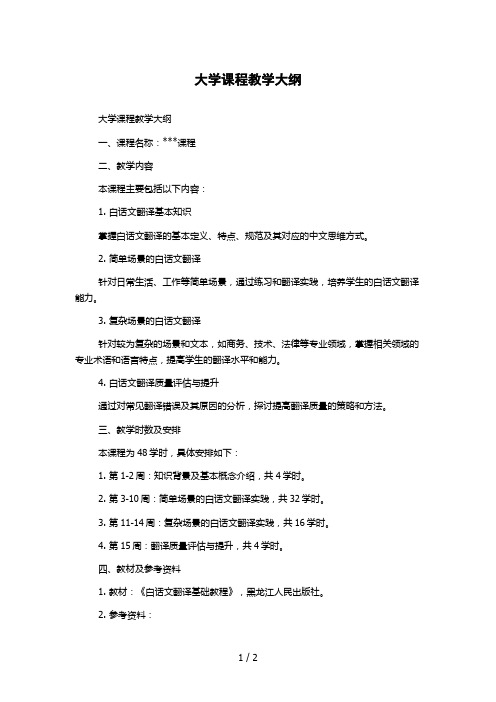
大学课程教学大纲大学课程教学大纲一、课程名称:***课程二、教学内容本课程主要包括以下内容:1. 白话文翻译基本知识掌握白话文翻译的基本定义、特点、规范及其对应的中文思维方式。
2. 简单场景的白话文翻译针对日常生活、工作等简单场景,通过练习和翻译实践,培养学生的白话文翻译能力。
3. 复杂场景的白话文翻译针对较为复杂的场景和文本,如商务、技术、法律等专业领域,掌握相关领域的专业术语和语言特点,提高学生的翻译水平和能力。
4. 白话文翻译质量评估与提升通过对常见翻译错误及其原因的分析,探讨提高翻译质量的策略和方法。
三、教学时数及安排本课程为48学时,具体安排如下:1. 第1-2周:知识背景及基本概念介绍,共4学时。
2. 第3-10周:简单场景的白话文翻译实践,共32学时。
3. 第11-14周:复杂场景的白话文翻译实践,共16学时。
4. 第15周:翻译质量评估与提升,共4学时。
四、教材及参考资料1. 教材:《白话文翻译基础教程》,黑龙江人民出版社。
2. 参考资料:(1)《白话文翻译指南》,商务印书馆。
(2)《白话文翻译案例分析》,人民出版社。
(3)《白话文翻译质量管理手册》,外语教学与研究出版社。
五、教学方法本课程采用多种教学方法:1. 课堂讲授:主要介绍相关知识和技能。
2. 组织优秀作品分享和分析:引导学生自主探究和思考,提高其分析和表达能力。
3. 课外翻译实践:鼓励学生通过实践提高白话文翻译能力。
4. 讨论和互动:引导学生思考相关问题,切实提高其思维能力和交际能力。
六、考核方式1. 平时成绩(40%):包括出勤、课堂表现、作业完成情况等。
书面作业占平时成绩的30%,课堂表现占平时成绩的10%。
2. 期末考试(60%):主要考核学生白话文翻译实践能力和对专业知识的掌握情况。
七、教学目标1. 掌握白话文翻译的基本知识和技能。
2. 能够应对日常生活、工作等场景下的白话文翻译需求。
3. 能够熟练运用专业术语和语言,在商务、法律、技术等领域完成相关文本的翻译。
课程教学大纲范例

引言:课程教学大纲是一份指导教师教学并提供学生学习导向的重要文件。
它相当于教学计划的框架,明确了课程的目标、内容、教学方法、评估标准等,在教学过程中起到了关键的作用。
本文将以某个特定课程的教学大纲范例为例,进行详细的阐述。
概述:本文所使用的教学大纲范例是一个面向大学本科学生的课程,旨在为学生提供一定的基础知识和实践能力,帮助他们理解和应用该领域的核心概念和理论。
该教学大纲包含了课程的目标、内容、教学方法、评估方法以及资源需求等方面的信息。
正文:一、课程概述1.1课程目标1.2课程背景1.3课程学分与学时1.4课程前置要求二、课程内容2.1主要教学内容2.2课程重点与难点2.3教材与参考书目2.4在线资源与学习平台2.5实践活动与案例分析三、教学方法3.1授课方式3.2讲授与互动3.3小组讨论与合作学习3.4实验与实践3.5个性化学习支持四、评估方法与标准4.1课堂表现评估4.2作业与实验报告评估4.3期中和期末考试4.4课程总评与绩点计算4.5学生反馈与评估改进五、资源需求5.1教师资源5.2教室与设备资源5.3图书与资料资源5.4实践与实验资源5.5学生支持与辅导资源总结:课程教学大纲是一份重要的教育文件,它对于教师和学生在课程教学和学习过程中起到了指导的作用。
本文以一个面向大学本科学生的课程的教学大纲范例为例,对其进行了详细的阐述。
教学大纲中包含了课程目标、内容、教学方法、评估方法以及资源需求等重要信息,这些信息有助于教师进行教学计划的制定和教学活动的组织,也为学生提供了学习的方向和目标。
同时,教学大纲还需要不断进行反馈和改进,以提高教学质量和学生的学习效果。
课程教学大纲
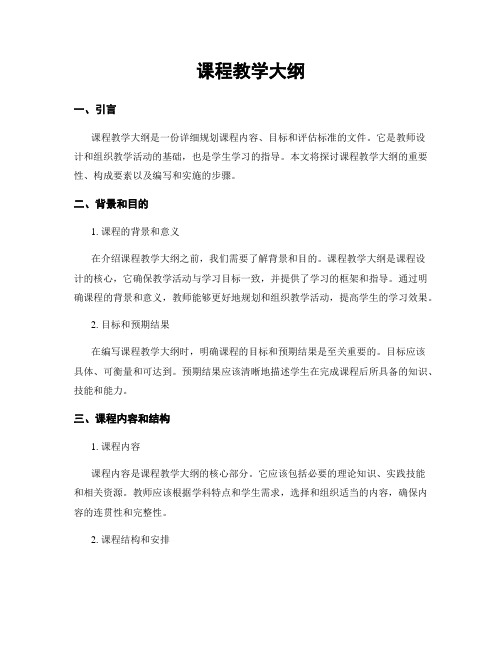
课程教学大纲一、引言课程教学大纲是一份详细规划课程内容、目标和评估标准的文件。
它是教师设计和组织教学活动的基础,也是学生学习的指导。
本文将探讨课程教学大纲的重要性、构成要素以及编写和实施的步骤。
二、背景和目的1. 课程的背景和意义在介绍课程教学大纲之前,我们需要了解背景和目的。
课程教学大纲是课程设计的核心,它确保教学活动与学习目标一致,并提供了学习的框架和指导。
通过明确课程的背景和意义,教师能够更好地规划和组织教学活动,提高学生的学习效果。
2. 目标和预期结果在编写课程教学大纲时,明确课程的目标和预期结果是至关重要的。
目标应该具体、可衡量和可达到。
预期结果应该清晰地描述学生在完成课程后所具备的知识、技能和能力。
三、课程内容和结构1. 课程内容课程内容是课程教学大纲的核心部分。
它应该包括必要的理论知识、实践技能和相关资源。
教师应该根据学科特点和学生需求,选择和组织适当的内容,确保内容的连贯性和完整性。
2. 课程结构和安排课程结构和安排是指将课程内容划分为不同的模块或单元,并安排在一定的时间框架内。
教师应该合理安排每个模块的学习时间和学习活动,确保学生能够逐步掌握和应用所学知识。
四、教学方法和评估方式1. 教学方法教学方法是指教师在教学过程中使用的策略和技巧。
教师应该根据课程的性质和学生的需求,选择适当的教学方法,如讲授、讨论、实践和案例分析等,以促进学生的主动参与和深入理解。
2. 评估方式评估方式是指用于评价学生学习成果和教学效果的方法和工具。
教师应该根据课程目标和预期结果,选择适当的评估方式,如考试、作业、项目和小组讨论等,以全面了解学生的学习情况和能力发展。
五、实施和改进1. 实施步骤实施课程教学大纲需要教师进行详细的计划和准备。
教师应该根据大纲的内容和结构,制定每节课的教学计划,并准备相关的教学材料和资源。
在教学过程中,教师应该密切关注学生的学习情况,并及时调整教学策略和方法。
2. 改进和反思课程教学大纲是一个动态的文件,教师应该不断改进和完善它。
课程设计课程教学大纲
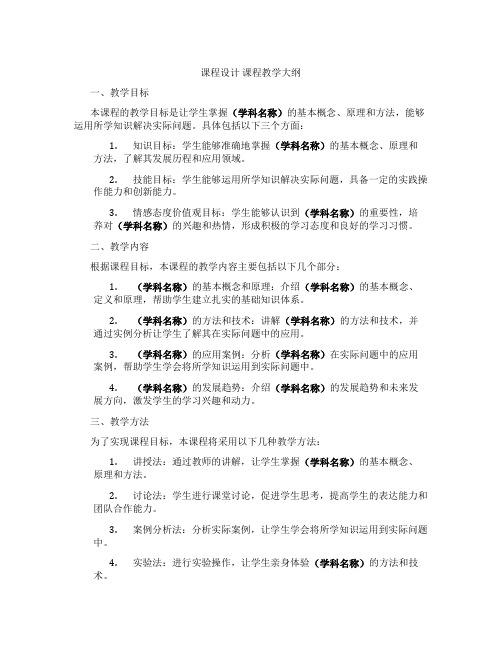
课程设计课程教学大纲一、教学目标本课程的教学目标是让学生掌握(学科名称)的基本概念、原理和方法,能够运用所学知识解决实际问题。
具体包括以下三个方面:1.知识目标:学生能够准确地掌握(学科名称)的基本概念、原理和方法,了解其发展历程和应用领域。
2.技能目标:学生能够运用所学知识解决实际问题,具备一定的实践操作能力和创新能力。
3.情感态度价值观目标:学生能够认识到(学科名称)的重要性,培养对(学科名称)的兴趣和热情,形成积极的学习态度和良好的学习习惯。
二、教学内容根据课程目标,本课程的教学内容主要包括以下几个部分:1.(学科名称)的基本概念和原理:介绍(学科名称)的基本概念、定义和原理,帮助学生建立扎实的基础知识体系。
2.(学科名称)的方法和技术:讲解(学科名称)的方法和技术,并通过实例分析让学生了解其在实际问题中的应用。
3.(学科名称)的应用案例:分析(学科名称)在实际问题中的应用案例,帮助学生学会将所学知识运用到实际问题中。
4.(学科名称)的发展趋势:介绍(学科名称)的发展趋势和未来发展方向,激发学生的学习兴趣和动力。
三、教学方法为了实现课程目标,本课程将采用以下几种教学方法:1.讲授法:通过教师的讲解,让学生掌握(学科名称)的基本概念、原理和方法。
2.讨论法:学生进行课堂讨论,促进学生思考,提高学生的表达能力和团队合作能力。
3.案例分析法:分析实际案例,让学生学会将所学知识运用到实际问题中。
4.实验法:进行实验操作,让学生亲身体验(学科名称)的方法和技术。
四、教学资源为了支持教学内容和教学方法的实施,本课程将采用以下教学资源:1.教材:选择合适的教材,作为学生学习的主要参考资料。
2.参考书:推荐一些相关的参考书,供学生拓展阅读。
3.多媒体资料:利用多媒体课件、视频等资料,丰富教学手段,提高学生的学习兴趣。
4.实验设备:准备实验设备,让学生能够亲身体验(学科名称)的方法和技术。
五、教学评估本课程的评估方式包括平时表现、作业和考试三个部分,以全面客观地评价学生的学习成果。
课程教学大纲精选
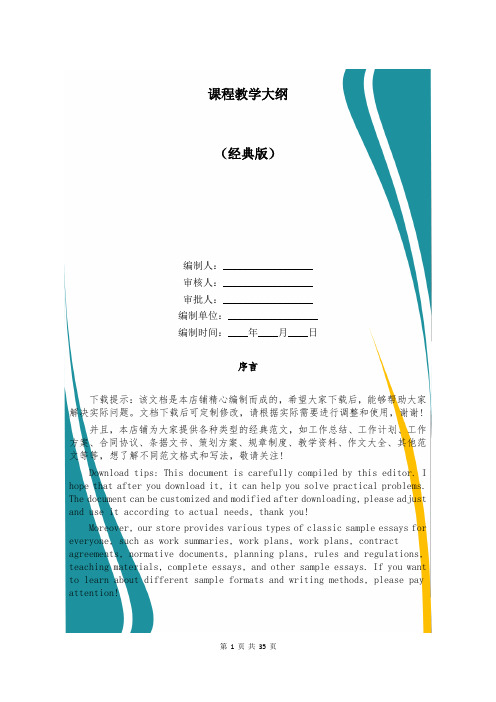
课程教学大纲(经典版)编制人:__________________审核人:__________________审批人:__________________编制单位:__________________编制时间:____年____月____日序言下载提示:该文档是本店铺精心编制而成的,希望大家下载后,能够帮助大家解决实际问题。
文档下载后可定制修改,请根据实际需要进行调整和使用,谢谢!并且,本店铺为大家提供各种类型的经典范文,如工作总结、工作计划、工作方案、合同协议、条据文书、策划方案、规章制度、教学资料、作文大全、其他范文等等,想了解不同范文格式和写法,敬请关注!Download tips: This document is carefully compiled by this editor. I hope that after you download it, it can help you solve practical problems. The document can be customized and modified after downloading, please adjust and use it according to actual needs, thank you!Moreover, our store provides various types of classic sample essays for everyone, such as work summaries, work plans, work plans, contract agreements, normative documents, planning plans, rules and regulations, teaching materials, complete essays, and other sample essays. If you want to learn about different sample formats and writing methods, please pay attention!课程教学大纲课程教学大纲模板精品8篇课程教学大纲模板1一、课程性质与目的:作为高校大学生思想政治教育课程系列的大学生成长成才导读课程,它是衔接第一课堂和第二课堂的重要桥梁和纽带,对于改进大学生思想政治教育的时效和实效具有重要作用。
课程教学大纲和教学大纲

课程教学大纲和教学大纲课程教学大纲和教学大纲的重要性在教育领域中,课程教学大纲和教学大纲是非常重要的文件。
它们为教师和学生提供了一个明确的指导框架,以确保教学的连贯性和有效性。
本文将探讨课程教学大纲和教学大纲的定义、作用以及如何编写和实施这些文件。
首先,课程教学大纲是一份详细描述课程内容和教学目标的文件。
它通常包括课程的名称、学时、学分、教学目标、教学方法、评估方法等。
教师可以根据教学大纲来组织课程内容,确保教学的系统性和完整性。
学生也可以通过阅读教学大纲了解课程的要求和目标,更好地准备学习。
教学大纲则是一份具体规划教学活动和教学过程的文件。
它包括每堂课的具体内容、教学方法、教学资源、评估方式等。
教师可以根据教学大纲来设计每堂课的教学活动,确保教学的连贯性和有效性。
学生可以通过阅读教学大纲来了解每堂课的内容和要求,更好地参与学习。
课程教学大纲和教学大纲的作用不仅在于提供教学指导,还可以促进教师和学生之间的沟通和合作。
教师可以通过教学大纲向学生传达教学目标和要求,帮助他们理解和掌握课程内容。
学生可以通过教学大纲了解教师的期望和要求,更好地参与学习并提高学习效果。
编写和实施课程教学大纲和教学大纲需要一定的专业知识和经验。
首先,教师需要对所教授的学科有深入的了解和熟悉。
他们需要确定教学目标和要求,以及合适的教学方法和评估方式。
其次,教师还需要考虑学生的学习特点和需求。
他们可以根据学生的背景和兴趣来调整教学内容和方法,以提高学生的学习积极性和效果。
在实施教学大纲时,教师需要根据教学大纲来组织教学活动,并根据学生的学习情况进行适当的调整。
教师还需要及时反馈学生的学习成果和困难,以便及时调整教学策略和方法。
学生则需要按照教学大纲的要求来学习和参与教学活动,同时积极反馈自己的学习情况和困难,以便及时获得帮助和指导。
总之,课程教学大纲和教学大纲在教育领域中扮演着重要的角色。
它们为教师和学生提供了一个明确的指导框架,以确保教学的连贯性和有效性。
教学大纲课程标准模板
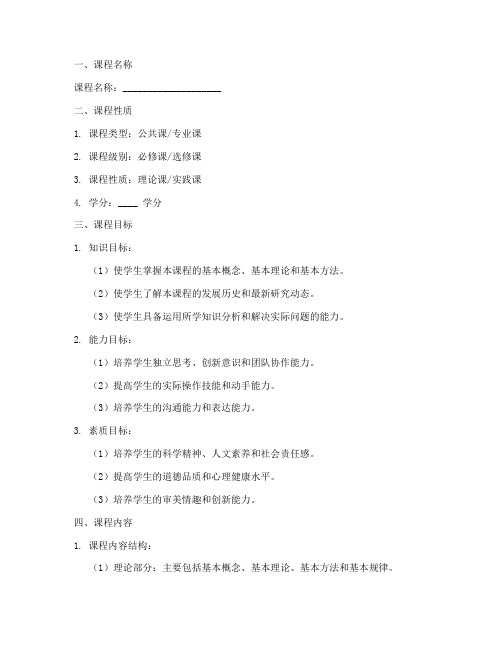
一、课程名称课程名称:____________________二、课程性质1. 课程类型:公共课/专业课2. 课程级别:必修课/选修课3. 课程性质:理论课/实践课4. 学分:____ 学分三、课程目标1. 知识目标:(1)使学生掌握本课程的基本概念、基本理论和基本方法。
(2)使学生了解本课程的发展历史和最新研究动态。
(3)使学生具备运用所学知识分析和解决实际问题的能力。
2. 能力目标:(1)培养学生独立思考、创新意识和团队协作能力。
(2)提高学生的实际操作技能和动手能力。
(3)培养学生的沟通能力和表达能力。
3. 素质目标:(1)培养学生的科学精神、人文素养和社会责任感。
(2)提高学生的道德品质和心理健康水平。
(3)培养学生的审美情趣和创新能力。
四、课程内容1. 课程内容结构:(1)理论部分:主要包括基本概念、基本理论、基本方法和基本规律。
(2)实践部分:主要包括实验、实习、实训等。
(3)案例分析:结合实际案例,分析问题、解决问题。
2. 课程内容安排:(1)第一章:_________________________(2)第二章:_________________________(3)第三章:_________________________(4)第四章:_________________________(5)第五章:_________________________(6)第六章:_________________________(7)第七章:_________________________(8)第八章:_________________________五、教学方法与手段1. 教学方法:(1)讲授法:系统讲解课程内容,提高学生的理论素养。
(2)讨论法:引导学生积极参与课堂讨论,培养学生的思辨能力。
(3)案例分析法:结合实际案例,提高学生的实践能力。
(4)实验法:通过实验操作,使学生掌握实际操作技能。
课程教学大纲基本格式

课程教学大纲基本格式一、引言课程教学大纲是一份用于指导教师开展教学工作的重要文档,它对于课程目标、教学内容和评估方式等进行了规范和界定。
本文将介绍课程教学大纲的基本格式,以帮助教师们更好地编写和使用教学大纲。
二、课程信息1. 课程名称:在这一部分,需要明确课程的名称,以便学生和其他教师能够准确地识别和理解该课程。
2. 课程编号:该部分包含课程的唯一编号,以帮助学生和教务部门管理课程。
3. 学分和学时:在这一部分,需要说明该课程的学分和学时安排,以给学生和教务部门提供参考。
三、课程目标1. 教学目标:该部分需要明确课程的教学目标,包括知识、技能和态度方面的目标。
教师可以借鉴学科标准和学校要求,制定相应的教学目标。
2. 学习成果:在这一部分,需要列出学生在该课程学习结束后应达到的具体能力和知识水平。
四、教学内容1. 教材:该部分需要明确所使用的教材名称、版次和作者等信息,以便学生能够准备和使用相应的教材。
2. 教学大纲结构:在这一部分,需要按照教材的章节顺序,列出每个章节的教学内容和学习目标。
五、教学方法1. 教学策略:该部分需要说明教师在教学过程中所采用的具体教学策略,如讲授、讨论、实验等。
2. 学生参与:在这一部分,需要强调学生在教学过程中的积极参与,如提问、小组讨论、案例分析等。
六、教学评估1. 评估方式:该部分需要明确教学评估的具体方式和要求,如考试、作业、小组项目等。
2. 评估标准:在这一部分,需要明确评估的标准和要求,以便学生和教师都能清晰地了解评分标准。
七、参考资料在这一部分,可以列出教师在编写教学大纲时所参考的相关文献和资料。
八、附录在这一部分,可以列出与课程教学大纲有关的附加信息,如教学日历、课程大纲修改历史等。
结语以上就是课程教学大纲的基本格式。
编写一份清晰、详细的教学大纲对于教师来说非常重要,它不仅可以帮助教师组织教学内容,还可以提供给学生和其他教师参考。
希望本文对于编写和使用课程教学大纲的教师们有所帮助。
课程设计教学大纲
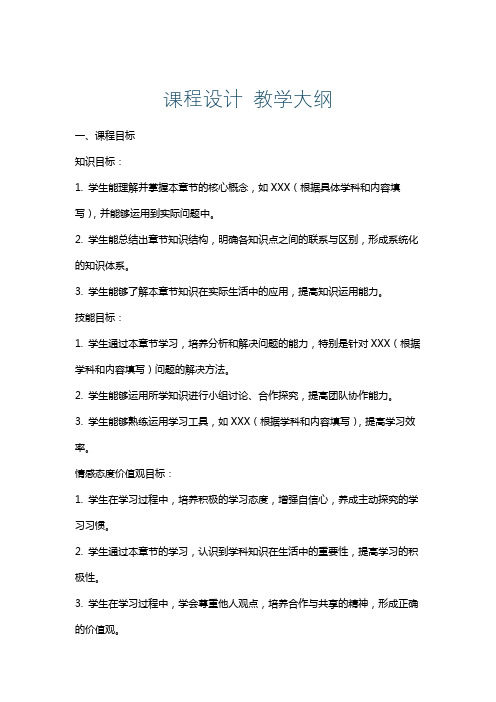
课程设计 教学大纲一、课程目标知识目标:1. 学生能理解并掌握本章节的核心概念,如XXX(根据具体学科和内容填写),并能够运用到实际问题中。
2. 学生能总结出章节知识结构,明确各知识点之间的联系与区别,形成系统化的知识体系。
3. 学生能够了解本章节知识在实际生活中的应用,提高知识运用能力。
技能目标:1. 学生通过本章节学习,培养分析和解决问题的能力,特别是针对XXX(根据学科和内容填写)问题的解决方法。
2. 学生能够运用所学知识进行小组讨论、合作探究,提高团队协作能力。
3. 学生能够熟练运用学习工具,如XXX(根据学科和内容填写),提高学习效率。
情感态度价值观目标:1. 学生在学习过程中,培养积极的学习态度,增强自信心,养成主动探究的学习习惯。
2. 学生通过本章节的学习,认识到学科知识在生活中的重要性,提高学习的积极性。
3. 学生在学习过程中,学会尊重他人观点,培养合作与共享的精神,形成正确的价值观。
课程性质:本课程为XXX学科(根据具体学科填写)的基础知识教学,旨在帮助学生掌握核心概念,提高解决问题的能力。
学生特点:本年级学生具有一定的认知能力和自主学习能力,对新鲜事物充满好奇心,但需引导和激发学习兴趣。
教学要求:教师需关注学生的个体差异,采用多样化教学手段,激发学生的学习兴趣,注重培养学生的实际应用能力和团队协作能力。
同时,注重情感态度价值观的培养,使学生在掌握知识的同时,形成正确的价值观。
在教学过程中,将课程目标分解为具体的学习成果,便于后续的教学设计和评估。
二、教学内容1. 教学大纲安排:- 章节一:XXX(根据具体学科和内容填写)- 课时1:XXX(具体内容点)- 课时2:XXX(具体内容点)- 课时3:XXX(具体内容点)- 章节二:XXX(根据具体学科和内容填写)- 课时4:XXX(具体内容点)- 课时5:XXX(具体内容点)- 课时6:XXX(具体内容点)2. 教学内容详细安排:- 知识点讲解:对核心概念、原理进行详细讲解,结合实例进行分析,帮助学生理解。
课程教学大纲怎么写
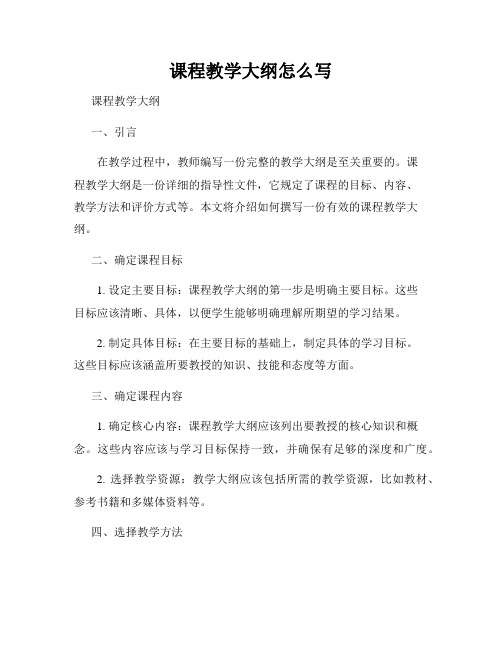
课程教学大纲怎么写课程教学大纲一、引言在教学过程中,教师编写一份完整的教学大纲是至关重要的。
课程教学大纲是一份详细的指导性文件,它规定了课程的目标、内容、教学方法和评价方式等。
本文将介绍如何撰写一份有效的课程教学大纲。
二、确定课程目标1. 设定主要目标:课程教学大纲的第一步是明确主要目标。
这些目标应该清晰、具体,以便学生能够明确理解所期望的学习结果。
2. 制定具体目标:在主要目标的基础上,制定具体的学习目标。
这些目标应该涵盖所要教授的知识、技能和态度等方面。
三、确定课程内容1. 确定核心内容:课程教学大纲应该列出要教授的核心知识和概念。
这些内容应该与学习目标保持一致,并确保有足够的深度和广度。
2. 选择教学资源:教学大纲应该包括所需的教学资源,比如教材、参考书籍和多媒体资料等。
四、选择教学方法1. 教学策略:根据教学目标和内容,选择合适的教学策略。
这些策略应该能够激发学生的学习兴趣,并促使他们积极参与。
2. 差异化教学:考虑到学生的不同学习需求和能力水平,教学大纲应该包括差异化教学的方法和策略。
五、设计评价方式1. 设定评价标准:确定学生应该达到的评价标准,并明确如何评估学生的学习成果。
2. 选择评价方法:根据目标和内容,选择适当的评价方法,比如考试、作业、项目和口头报告等。
六、课程安排1. 设定课时分配:根据课程目标和内容,合理分配每个单元或主题的课时数量。
2. 时间表安排:设计一个时间表,确保每个单元或主题可以按计划进行。
七、教学大纲更新随着教学环境和学生需求的变化,教学大纲需要定期更新。
教师应该及时跟踪课程进展,并根据需要进行适当的调整和修改。
结论一份全面而清晰的课程教学大纲可以为教师提供一个指导和参考框架,确保教学活动的有序进行。
通过合理的目标设置、内容安排和评价方式选择,教师可以帮助学生实现预期的学习成果。
因此,编写一份有效的课程教学大纲对于提高教学质量和学生学习经验至关重要。
注意:以上只是一份简单的示范教学大纲,并不代表具体某个学科的教学大纲。
教学大纲正确样式及范例
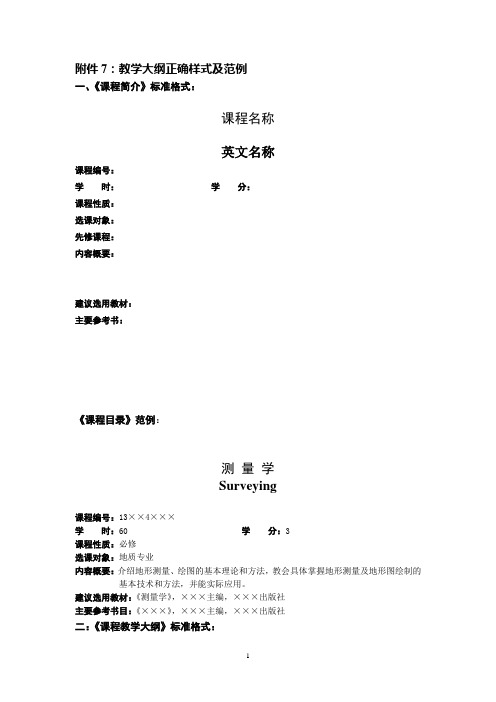
附件7:教学大纲正确样式及范例一、《课程简介》标准格式:课程名称英文名称课程编号:学时:学分:课程性质:选课对象:先修课程:内容概要:建议选用教材:主要参考书:《课程目录》范例:测量学Surveying课程编号:13××4×××学时:60 学分:3课程性质:必修选课对象:地质专业内容概要:介绍地形测量、绘图的基本理论和方法,教会具体掌握地形测量及地形图绘制的基本技术和方法,并能实际应用。
建议选用教材:《测量学》,×××主编,×××出版社主要参考书目:《×××》,×××主编,×××出版社二:《课程教学大纲》标准格式:《×××××××××》教学大纲学时:学分:教学大纲说明一、课程目的与任务二、课程的基本要求三、与其它课程的联系和分工四、课程的内容与学时分配五、课程的性质及适用对象教学大纲内容选用教材和参考书目建议选用教材:主要参考书目:《课程教学大纲》范例:《普通地质学》教学大纲学时:80 学分:5教学大纲说明一、课程的目的与任务地质学是研究地球的一门科学。
它是自然科学中六大基础科学之一,地质学是人类认识世界,探索大自……二、课程的基本要求普通地质学》是地质学的入门,是深入学习地质不各门学科的基础与先导,具有启蒙性质。
通过本课程的教学,力图使学生……三、与其它课程的联系和分工本课程是地质学及其他地学专业的入门专业基础课,是一切地学课程的先导。
其任务就是为地学方面的后续课程的学习……五、课程的性质及适应对象地质类专业必修教学大纲内容第一章绪论地质学的任务、领域;《普通地质学》的定义、研究内容、研究意义。
……教学提示:本章重点在于让学生了解地质学的研究内容,任务和重要意义、增强学习的兴趣和从事地质事业的使命感。
课程教学大纲怎么写
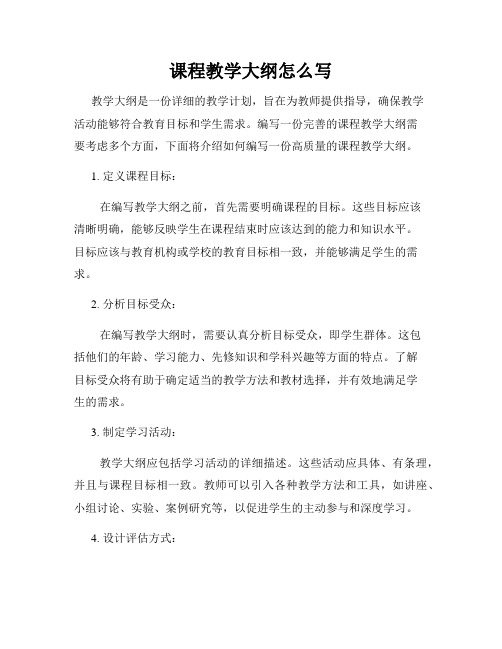
课程教学大纲怎么写教学大纲是一份详细的教学计划,旨在为教师提供指导,确保教学活动能够符合教育目标和学生需求。
编写一份完善的课程教学大纲需要考虑多个方面,下面将介绍如何编写一份高质量的课程教学大纲。
1. 定义课程目标:在编写教学大纲之前,首先需要明确课程的目标。
这些目标应该清晰明确,能够反映学生在课程结束时应该达到的能力和知识水平。
目标应该与教育机构或学校的教育目标相一致,并能够满足学生的需求。
2. 分析目标受众:在编写教学大纲时,需要认真分析目标受众,即学生群体。
这包括他们的年龄、学习能力、先修知识和学科兴趣等方面的特点。
了解目标受众将有助于确定适当的教学方法和教材选择,并有效地满足学生的需求。
3. 制定学习活动:教学大纲应包括学习活动的详细描述。
这些活动应具体、有条理,并且与课程目标相一致。
教师可以引入各种教学方法和工具,如讲座、小组讨论、实验、案例研究等,以促进学生的主动参与和深度学习。
4. 设计评估方式:编写教学大纲时,需要考虑如何评估学生的学习成果。
这可以通过形成性评估和终结性评估来实现。
形成性评估可以包括课堂作业、小组项目、期中考试等,用于检查学生的学习进展。
而终结性评估可以包括期末考试、论文或实践项目等,用于评估学生在课程结束时的掌握程度。
5. 选择教材和资源:教学大纲应包括所选教材和其他学习资源的详细描述。
教材需要与课程目标和学习活动相一致,能够帮助学生实现预期目标。
此外,教师还可以提供其他辅助资源,如网上教学视频、参考书籍、网站链接等,以丰富学生的学习经验。
6. 定义评估标准:教学大纲应明确评估标准,以衡量学生是否达到课程目标。
这些标准可以是具体的表现标准,例如完成特定任务、解决问题或呈现创造性作品。
评估标准应该公正、清晰,并且与课程目标相对应。
7. 课程大纲的反馈和修订:编写完教学大纲后,教师应该寻求同事或专家的意见和反馈。
这有助于发现潜在的不足和改进的空间。
教学大纲也应该不断修订和完善,以适应不断变化的教育环境和学生需求。
课程教学大纲范例
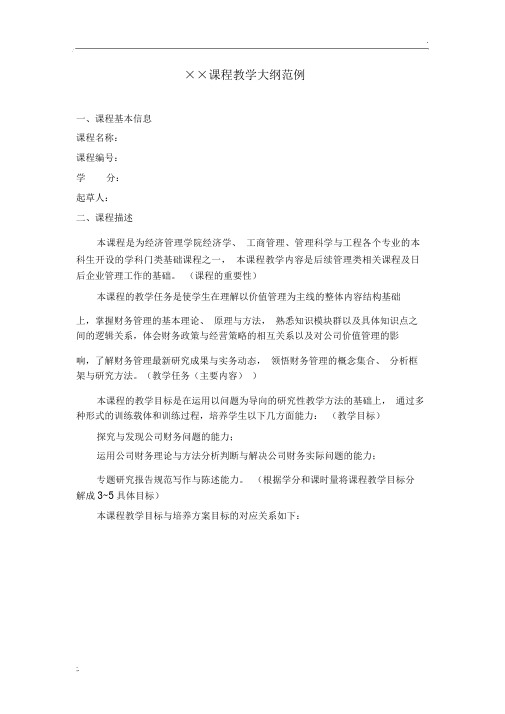
.××课程教学大纲范例一、课程基本信息课程名称:课程编号:学分:起草人:二、课程描述本课程是为经济管理学院经济学、工商管理、管理科学与工程各个专业的本科生开设的学科门类基础课程之一,本课程教学内容是后续管理类相关课程及日后企业管理工作的基础。
(课程的重要性)本课程的教学任务是使学生在理解以价值管理为主线的整体内容结构基础上,掌握财务管理的基本理论、原理与方法,熟悉知识模块群以及具体知识点之间的逻辑关系,体会财务政策与经营策略的相互关系以及对公司价值管理的影响,了解财务管理最新研究成果与实务动态,领悟财务管理的概念集合、分析框架与研究方法。
(教学任务(主要内容))本课程的教学目标是在运用以问题为导向的研究性教学方法的基础上,通过多种形式的训练载体和训练过程,培养学生以下几方面能力:(教学目标)探究与发现公司财务问题的能力;运用公司财务理论与方法分析判断与解决公司财务实际问题的能力;专题研究报告规范写作与陈述能力。
(根据学分和课时量将课程教学目标分解成 3~5 具体目标)本课程教学目标与培养方案目标的对应关系如下:.表 1:课程教学目标与培养方案目标的配置关系培养方案目标通过本课程的学习,学生将具备以下能力:培培培培培养养养养养要要要要要求求求求求⋯1234探究与发现公司财务问题的能力√√运用公司财务理论与方法分析判断与解决公司财务实际问题能力√√专题研究报告规范写作与陈述能力√√√⋯⋯√√ √三、前导课如没有前导课,可以填“无” 。
四、教学产出教学产出 1:(教学产出的描述应结合课程教学目标进行设计,是对课程整体教学目标的分解,全部教学产出应充分覆盖课程整体教学目标。
)完成标准:(完成标准结合应结合教学产出 1 的教学目标进行设计,,是对教学产出 1 教学目标的分解,全部完成标准应充分覆盖教学产出 1 的教学目标。
)标准 1a:标准 1b:标准 1c:教学产出 2:(教学产出的描述应结合课程教学目标进行设计,是对课程整体教学目标的分解,全部教学产出应充分覆盖课程整体教学目标。
高校课程教学大纲模板

一、课程基本信息1. 课程名称:2. 授课教师:3. 上课时间:4. 上课地点:5. 课程性质(必修/选修):6. 学分:7. 学时:8. 适用专业:9. 先修课程:10. 后续课程:二、课程目标1. 知识目标:a. 学生应掌握的课程基本理论知识;b. 学生应了解的课程相关前沿动态;c. 学生应具备的课程实际应用能力。
2. 能力目标:a. 学生应具备的课程基本技能;b. 学生应具备的课程创新能力;c. 学生应具备的课程团队协作能力。
3. 素质目标:a. 学生应具备的课程道德素养;b. 学生应具备的课程人文素养;c. 学生应具备的课程社会适应能力。
三、课程内容与教学安排1. 教学内容:a. 课程概述;b. 理论知识;c. 实践环节;d. 案例分析;e. 总结与展望。
2. 教学方法:a. 讲授法;b. 讨论法;c. 案例分析法;d. 实践操作法;e. 多媒体教学。
3. 教学进度安排:a. 每周教学时数;b. 各章节教学内容及学时分配;c. 课堂讨论、实践操作、案例分析等环节安排。
四、考核方式与成绩评定1. 考核方式:a. 平时成绩(30%);b. 期中考试成绩(30%);c. 期末考试成绩(40%)。
2. 成绩评定:a. 平时成绩:包括课堂表现、作业、实验报告等;b. 期中考试成绩:以闭卷考试形式进行;c. 期末考试成绩:以闭卷考试形式进行。
五、教材与参考书目1. 教材:a. 《课程名称》教材(版本、作者、出版社)。
2. 参考书目:a. 《课程名称》相关参考书籍(作者、出版社)。
六、教学资源1. 教学课件、视频等;2. 网络教学平台;3. 实践基地、实验室等。
七、教学反馈与评价1. 教师评价:a. 教学大纲执行情况;b. 教学效果;c. 学生反馈。
2. 学生评价:a. 课程满意度;b. 教学方法;c. 课程内容。
请注意,以上模板仅供参考,具体内容可根据实际情况进行调整。
- 1、下载文档前请自行甄别文档内容的完整性,平台不提供额外的编辑、内容补充、找答案等附加服务。
- 2、"仅部分预览"的文档,不可在线预览部分如存在完整性等问题,可反馈申请退款(可完整预览的文档不适用该条件!)。
- 3、如文档侵犯您的权益,请联系客服反馈,我们会尽快为您处理(人工客服工作时间:9:00-18:30)。
课程教学大纲 课程基本信息(Course Information)
课程代码 (Course Code) PH416
学时
(Credit Hours)
48
学分
(Credits)
3
课程名称 (Course Name) (中文)激光原理与技术
(英文)Principles and Technologies of Lasers
课程性质
(Course Type)
应用物理学专业选修课 授课语言
(Language of
Instruction)
中文
开课院系
(School)
物理与天文学院 先修课程
(Prerequisite)
普通物理
授课教师 (Teacher) 钟晓霞
电邮、电话
(email& phone)
xxzhong@
办公时间 (Office Time) 周一至周五
办公地点
(Office Location)
物理楼703A
课程网址 (Course Webpage)
*课程简介(Description) 该课程旨在教授和激光有关的基本概念和技术,包括爱因斯坦关系式、光子简并度、集居数反转、增益饱和、光学谐振腔、纵模和横模、高斯光束、频率牵引、拉姆凹陷、调Q 技术、锁模技术等。
授课思路如下:1. 介绍激光产生的历史背景和进程,特别是量子力学的发展对激光产生的影响;2. 介绍光和物质的相互作用,重点介绍基于不同介质的增益线型、增益饱和现象;3. 介绍无源谐振腔,引出纵模和横模、高斯光束、腔损耗的概念;4. 在上述2、3 基础上,探讨有源腔内光和物质相互作用,具体介绍连续激光器和脉冲激光器的工作原理和相关技术。
The purpose of this course is to let students become familiar with some key concepts and technologies in Lasers, including Einstein relation, Photon degeneracy , Population inversion, homogeneous broadening, Inhomogeneous broadening, Gain saturation, Optical resonator, longitudinal and lateral mode, Gaussian beam, Frequency pulling, Lamb dip, Q switching, Mode locking etc.. The class is taught in this way: first of all, a brief history of laser especially its relationship with the development of quantum mechanics is given; Next, the interaction of light with matter especially gain saturation are introduced; Furthermore, the properties of passive optical resonator especially properties and transformation of Gaussian beam are demonstrated; Finally, continuous wave laser behavior and transient laser behavior are presented.
课程教学大纲(course syllabus)
*学习目标(Learning Outcomes) 1. 基本概念Fundamental physics content: understand key aspects of Optical resonators, the interaction of light with matter, will have a good understanding of the basic science of lasers, an overview of the varieties of lasers and their features
2. 基本方法Physical methodology: While studying the material in this course, you will encounter, practice and apply core physical principles such as Fourier transforms (to relate spread in time and frequency of laser pulses), rate equation, wave equations, diffraction theory, and so forth.
3. 技术应用 Technological Applications: You will appreciate how the properties of lasers drive their many applications in both fundamental science and technology.
*教学内容、进度安
排及要求 (Class Schedule &Requirements)
教学内容 学时 教学方式作业及
要求
基本要求 考查方式
激光简史( A brief
history of lasers )
8 板书+ppt每周一
次,可以
讨论,独
立完成
掌握光子简并
度、集居数反
转、速率方程等
基本概念和方
法;了解量子力
学的发展对激
光产生的影响。
考试+作
业
无源腔(Passive
Optical
Resonator)
10 板书+ppt每周一
次,可以
讨论,独
立完成
掌握高斯光束
的推导及空间
传输特性
考试+作
业
光和物质相互作
用(Interaction of
light with matter)
10 板书+ppt每周一
次,可以
讨论,独
立完成
掌握均匀加宽、
非均匀加宽、增
益饱和的机理
考试+作
业
连续激光器
(Continuous Wave
laserBehavior)
10 板书+ppt每周一
次,可以
讨论,独
立完成
掌握连续激光
器工作原理和
特点
考试+作
业
脉冲激光器
( Transient Laser
behavior )
10 板书+ppt每周一
次,可以
讨论,独
立完成
掌握调Q、锁
模等技术
考试+作业
*考核方式 (Grading) 平时作业(Homework): 20% ,检验平时学习效果,鼓励讨论;
期中考试(Midterm Exam): 30%,检验上半学期的学习效果,开卷考试为主; 期末考试(Final Exam): 40%,检验整个学期的学习,闭卷考试;
小论文(Thesis): 10%,检验学生灵活掌握知识的能力,题目自选。
*教材或参考资料 (Textbooks & Other Materials) 教材: Principles of Lasers,第五版(2010),作者: OrazioSvelto。
辅助读物:激光导论, 作者:陈英礼
其它
(More)
备注
(Notes)
备注说明:
1.多于1位教师授课的课程,如公共课程、基础课程等经教学团队商议后由负责人填写。
2.带*为必填项目,其他栏目根据课程情况选填。
3.课程简介字数为300‐500字;课程大纲以表述清楚教学安排为宜,字数不限。
